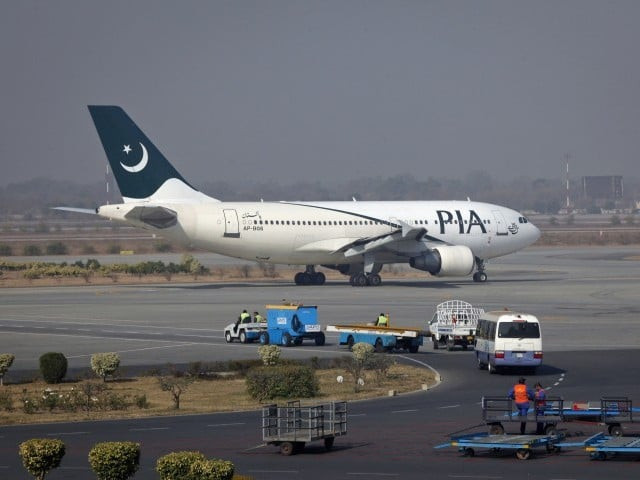Another PIA flight to bring stranded Pakistanis from Yemen
PIA flight is set to depart from Karachi to Djibouti at 4pm today; Pakistan faces dilemma whether to join coalition

12 Pakistanis from Multan stranded as their passports are held. PHOTO: REUTERS
A PIA flight led by Captain Sadiq Rehman is set to depart from Karachi to Djibouti at 4pm today to bring as many stranded Pakistanis back home.
Read: Pakistan 'examining' Saudi request over Yemen intervention
Stranded Pakistanis were instructed to arrive at Aden's port to be taken by ship to Djibouti. It has not been confirmed whether the ship will have the capacity to accommodate the 215 Pakistanis who have arrived at the port. The ship is set to leave the port in about three hours.
Read: Pakistani ambassador heads home, leaving hundreds stranded in Yemen
As firing continued throughout the night, passports of 12 Pakistanis from Multan have been held due to which they remain stranded in the conflict stricken country.
Read: Yemen imbroglio: Pakistan mulls limited mission for Saudi security
To join or not to join
Pakistan faces an unenviable dilemma - whether to join a Saudi Arabia-led coalition or stay out and risk angering its old ally which provides it with huge financial support.
Umair Javed, an analyst and writer, said Islamabad would be wary of committing to military action that might embolden already fearsome militant groups at home.
"Even though this conflict isn't overtly sectarian it might be presented as sectarian within Pakistan - groups that are hostile to Iran and to Shias in Pakistan will present it as a conflict between Sunnis and Shias," he told AFP.
Rifaat Hussain, leading analyst and university professor, told AFP: "Nawaz Sharif knows the military is totally tied up, a third of its strength is tied up in FATA, Pakistan is not in a position to make any troop contribution."
"Pakistan is very aware it is a tribal war, a tribal conflict, even though it has taken on a Sunni-Shia aspect and we don't want to muddy the waters by getting into this conflict unthinkingly," Hussain added.
It is not clear what consequences an outright refusal would bring for Pakistan, though Saudi might consider cutting back on aid and the cut-price oil it provides.
Islamabad's hand could be forced by the threat of Saudi sanctions, "given the reliance on Saudi foreign exchange (and) oil reserves", according to Javed.
Security analyst Talat Masood said last week Islamabad probably "doesn't have the luxury of refusing" Riyadh's request definitively.
And of course history is on the Saudis' side: Pakistani forces went to help protect the kingdom in the 1970s, 1980s and 1990s.
"At no point, ever, has a Pakistani military resisted going to Saudi Arabia," security expert Ayesha Siddiqa told AFP.
Pakistan-Saudi military ties
Military ties between the two countries date back to the 1960s, when Pakistan helped Riyadh build up its air force and supplied pilots to fly sorties against a South Yemeni incursion into the kingdom in 1969, US security expert and former CIA officer Bruce Riedel wrote in a Brookings Institution article.
In the 1980s Riyadh, along with the US, funnelled vast sums of money through Pakistan to fund the Afghan mujahideen's fight against Soviet occupation.
Cooperation and financial assistance has continued to flow from Riyadh, in the form of cheap oil and loans, including one of $1.5 billion last year.
When Prime Minister Nawaz Sharif was ousted in a military coup in 1999, it was Saudi Arabia that received him in exile.
But despite this history, there has been considerable resistance in Pakistani media this week to joining what is seen by many as a "foreign" war, with a bitter fight against terror outfits still going on at home.
The military is busy with a major operation against Tehreek-e-Taliban Pakistan hideouts in the tribal belt, on top of maintaining a heavy presence along the border with arch-foe India, and some argue its resources are too stretched to contribute in Yemen.



















COMMENTS
Comments are moderated and generally will be posted if they are on-topic and not abusive.
For more information, please see our Comments FAQ